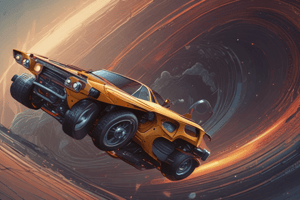Podcast
Questions and Answers
What is the unit of force in the International System of Units?
What is the unit of force in the International System of Units?
- Newton (correct)
- Joule
- Watt
- Kilogram
What type of force is exerted by a magnet on other magnets or magnetic substances?
What type of force is exerted by a magnet on other magnets or magnetic substances?
- Electrostatic force
- Gravity
- Frictional force
- Magnetic force (correct)
What is the result of multiple forces acting on an object in the same direction?
What is the result of multiple forces acting on an object in the same direction?
- The resultant force is zero
- The resultant force is the average of the individual forces
- The resultant force is the difference between the individual forces
- The resultant force is the sum of the individual forces (correct)
What is the force that depends on the masses of objects and the distance between them?
What is the force that depends on the masses of objects and the distance between them?
What is the effect of force on a stationary object?
What is the effect of force on a stationary object?
What represents the direction and magnitude of a force?
What represents the direction and magnitude of a force?
What is the term for the force that opposes motion between two surfaces in contact?
What is the term for the force that opposes motion between two surfaces in contact?
What is the measure of the gravitational force acting on an object?
What is the measure of the gravitational force acting on an object?
Which type of friction occurs when a car moves on a road?
Which type of friction occurs when a car moves on a road?
What is the main factor that affects the amount of friction between two surfaces?
What is the main factor that affects the amount of friction between two surfaces?
Which of the following is NOT a way to decrease friction?
Which of the following is NOT a way to decrease friction?
Which type of force is responsible for holding a magnet to a refrigerator?
Which type of force is responsible for holding a magnet to a refrigerator?
What type of friction occurs when a boat moves through water?
What type of friction occurs when a boat moves through water?
Which of the following is an example of a non-contact force?
Which of the following is an example of a non-contact force?
What type of friction is responsible for slowing down a moving object?
What type of friction is responsible for slowing down a moving object?
Which of the following is a way to increase friction?
Which of the following is a way to increase friction?
Flashcards are hidden until you start studying
Study Notes
The Effects of Force
- Force can make a stationary object move, increase or decrease the speed of a moving object, change the direction of a moving object, or stop a moving object.
- Force can change the shape of an object or break it.
- Force can also cause effects that are not related to motion, such as squeezing a lemon or pressing an inflated balloon.
Representing Force
- Force is represented by arrows, with the direction of the arrow showing the direction of the force and the length of the arrow representing the magnitude of the force.
- The SI unit of force is the newton (N).
Resultant Force
- When multiple forces act on an object, the effective force acting on the object along the direction of motion is called the resultant force.
- If forces act in the same direction, the resultant force is the sum of the individual forces.
- If forces act in opposite directions, the resultant force is the difference between the individual forces, with the direction being that of the stronger force.
Types of Forces
- Contact forces include muscular force, spring force, and frictional force.
- Non-contact forces include gravitational force, magnetic force, and electrostatic force.
Gravitational Force
- Gravitational force is an attractive force between any two objects in the universe.
- The gravitational force depends on the masses of the objects and the distance between them.
- Weight is a measure of the gravitational force acting on an object, and it varies depending on the location, unlike mass which is constant.
Magnetic Force
- Magnetic force is the force exerted by a magnet that affects other magnets or magnetic substances.
- Magnetic force can be attractive or repulsive, depending on the orientation of the poles.
Electrostatic Force
- Electrostatic force is the force between electric charges.
- It arises when objects are rubbed against each other, causing a buildup of electric charge.
Friction
- Friction is the force experienced when an object moves against another one.
- Friction arises due to the irregularities on the surfaces in contact.
- Types of friction include static friction, sliding friction, rolling friction, and fluid friction.
Factors Affecting Friction
- The nature of the surfaces in contact affects friction, with rough surfaces offering more friction than smooth surfaces.
- The mass of the objects in contact affects friction, with heavier objects experiencing more friction than lighter ones.
- The surface area in contact affects friction, with reducing the surface area decreasing friction.
The Effects of Friction
- Friction slows down a moving object.
- Friction produces heat.
- Friction causes wear and tear on moving parts.
Decreasing Friction
- Making surfaces smoother can decrease friction.
- Applying lubricants can reduce interlocking of surface irregularities.
- Using wheels or rollers can change sliding friction to rolling friction.
- Streamlining objects can reduce fluid friction.
Increasing Friction
- Increasing the roughness of surfaces in contact can increase friction.
- Using materials with higher friction coefficients can increase friction.
Studying That Suits You
Use AI to generate personalized quizzes and flashcards to suit your learning preferences.




